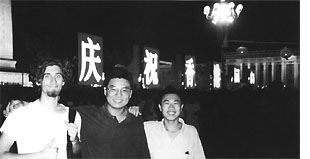
Spring
1998
![]()
![]()
Soundings is a publication of the School of Humanities and Social Science at MIT
Comments and questions to www-shss@mit.edu
The China connection
Going global
 |
|
(l to r) Dan Dwyer and Danial Hu, MIT undergraduates who worked at Beijing Number Four High School, with Cheng Ke, a student of the high school at Tian Anmen Square on June 29, immediately before teh return of Hong Kong to the People's Republic of China
|
When Dan Dwyer, '00, was given the opportunity to teach in China, he jumped at the chance. "I've always been interested in the world around me and experiencing as much as I can. Coming from Missouri, where there weren't too many Chinese people, this was very exciting — and a real stretch for me," says the physics major, who taught Beijing high school students how to connect to the Internet and navigate and program for the World Wide Web.
A participant in the MIT-China Educational Technology Initiative (CETI), Dwyer was one of 13 MIT undergraduates who worked in five high schools in Beijing, Shanghai, and Zian in 1997. Part of his culturally-broadening experience included dealing with his Chinese students' inclination to work separately and competitively, rather than collectively. "I had to come up with subtle ways to have them work together. And I had to find ways to spark the interest of each individual student. The experience," he observes wryly, "made me feel sorry for some of my own teachers at MIT."
Dwyer is one small part of a broad new educational and research vision at the Institute. With the increasing internationalization of knowledge, innovation and economy, MIT is pushing forward with a broad palette of programs to prepare students and faculty to participate in this fast-emerging global culture. To achieve the vision and amass needed resources, the MIT International Science and Technology Initiative (MISTI) was set up in 1995, with China as the first focus, at the School's Center for International Studies. MISTI/Germany was set up one year later.
Palette of programs
The initiative to create educational and research opportunities in China is multi-pronged. The China Student Internship Program, for example, aims to develop deep cross-cultural understandings and international scientific collaborations, as well as strengthen research and education at MIT. Since 1994, 45 interns, both graduate and undergraduate, have spent from several months to a year in business and research institutions in mainland China, Hong Kong, or Taiwan. Trained in Chinese language, history, and culture, participants work in such sites as General Motors, Beijing or Polaroid, Shanghai. IBM, Siemens, Ingersoll-Rand, Shanghai Jiahua Company, and Hong Kong Airport Authority are typical of the host organizations.
A related venture led by MISTI Director, Suzanne Berger, the Raphael and Helen Starbuck Professor of Political Science, and Richard Lester, professor of nuclear engineering, is Made By Hong Kong, a year-long, multi-disciplinary investigation into the economic power of Hong Kong. The project upset the accepted view that Hong Kong industry had no future. "On the contrary," says Berger. "We found that Hong Kong has the capability to become a world-class industrial power. To realize this ambition, it needs to strike out in a new direction — toward service-enhanced products." Berger and Lester published the team's pioneering findings in Made By Hong Kong, an instant bestseller in Hong Kong.
Innovative collaborations
Striking a different note in the MISTI symphony is a Chinese musical project involving Elaine Chew, a concert pianist and PhD candidate in Operations Research at the Sloan School of Management. Chew spent three weeks in Beijing in the summer of 1997 researching and collecting modern Chinese music, a genre that sprouted in the 1930s. Most of the works are unavailable outside China and difficult to find even within the country, since they are out of print. Essays about the work appear only in Chinese. Aiming to bring the music beyond China's borders, Chew met with musicians and scholars in China and scoured music book-stores to collect musical scores, recordings, and literature. She returned with 140 pounds of music books, one-third of which the MIT music library now owns. Chew herself performed some of the rarely-heard compositions at recitals at MIT and Lincoln Laboratory; she will also present them at a variety of international venues, including the President's Charity Concert in Singapore with the Singapore Symphony Orchestra.
"MISTI's China program is key to developing a world-class center for Chinese studies at MIT," says Berger, adding that "China has vast potential for scientific and technological innovations. Working in partnership with leading Chinese institutions, our students and faculty are forging connections that will have lifelong professional impact. As we at MIT work on the frontiers of knowledge creation and application here and abroad, we strengthen our own research capabilities and contribute to American society."
Copyright © 2000 Massachusetts Institute of Technology